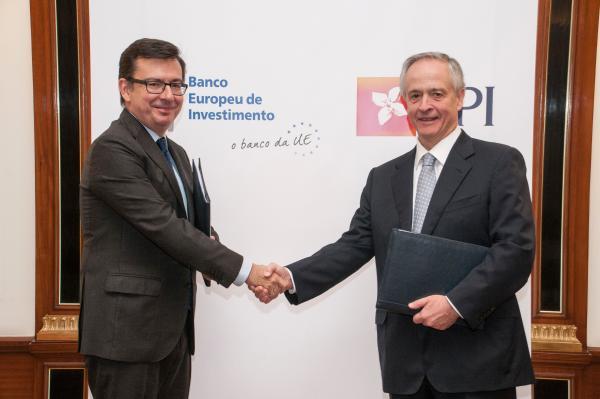
The European Investment Bank (EIB) has granted Banco BPI a total of EUR 350 million through a EUR 300 million loan to finance investments of mainly small and medium-sized companies and an additional EUR 50 million loan aimed at financing corporate energy efficiency investments in Portugal.
EIB Vice-President, Román Escolano, and Banco BPI CEO, Fernando Ulrich, have signed today in Lisbon the first EUR 300 million tranche of a total EIB EUR 400 million loan that will contribute to provide funding with favourable interest rates and longer tenor for Portuguese SMEs (firms up to 250 employees) and midcaps (firms with up to 3.000 employees) in order to foster economic growth and employment creation in Portugal. Around 30% of the total loan could be used to finance small projects implemented by public sector entities, notably municipalities and local enterprises throughout Portugal.
This is the fifth EIB operation with Banco BPI under the same framework aimed at supporting small and medium-size Portuguese companies in order to facilitate sustainable growth. The last one was a EUR 300 loan signed in 2014 that has promoted more than 1.300 projects in different sectors of industry and services.
Additionally, the EIB has signed today with Banco BPI a EUR 50 million loan under the EIB and European Commission’s new Private Finance For Energy Efficiency (PF4EE) instrument. This EIB financial support will foster the development of energy efficiency and small renewable energy investments mainly in the corporate sector in Portugal.
The PF4EE instrument combines three elements. The first consists of an EIB loan to improve the funding conditions of the energy efficiency investments financed by local banks. The second component provides partial risk protection on partner banks’ loans. The third element will strengthen the lending capacity specifically targeted at energy efficiency investments by passing on technical and financial expertise gained from similar schemes elsewhere in the EU.
This latter EIB funding and risk sharing with the European Commission will facilitate the implementation of measures such as the improvement of roofs, walls, windows and energy equipment in buildings, the modernisation of lighting systems and the installation of technologies that will allow the use of clean energy in industrial production for self-consumption. Therefore, this EIB 50 million loan to BPI will contribute to reduce CO2 emissions and to improve energy efficiency. The projects to be financed are located in Portugal.
In the signature ceremony, EIB Vice-President, Román Escolano, said: «Financing small and medium business and energy efficiency investments are two relevant EIB’s priorities in Portugal. These two loans signed today in Lisbon with BPI will facilitate EIB funding with financial advantages to support Portuguese SMEs and MidCaps, a fundamental pillar of employment creation in the country, in a broad range of productive sectors while fostering, at the same time, the use of clean energies».
Banco BPI CEO, Fernando Ulrich, stated that «this fifth SME & midcap loan operation is the 30th contract signed with the EIB, a long standing partnership with BPI very successfully initiated in 1983 in operations that have reached so far almost EUR 2.5 billion. It confirms the highest priority that BPI continues to attach to SMEs & midcaps in its lending policy for 2017 and beyond. As far as the new PF4EE is concerned, BPI is delighted to have been selected again by the EIB – in response to a public call launched by the EIB in 2015 - as the first EIB and EC intermediary in Portugal in the utilization of a new lending instrument to support small and medium sized projects aiming exclusively at energy efficiency».
Commenting on this signature, European Commissioner for Climate Action and Energy, Miguel Arias Cañete said: «The cheapest energy is the one we do not use. With more energy savings, businesses and entrepreneurs have more resources at their disposal to create more jobs and growth. These EUR 50 million will help SMEs in Portugal to save money and to reduce their carbon emissions».

Photographer: EIB ©BPI
Download original

Photographer: EIB ©BPI
Download original